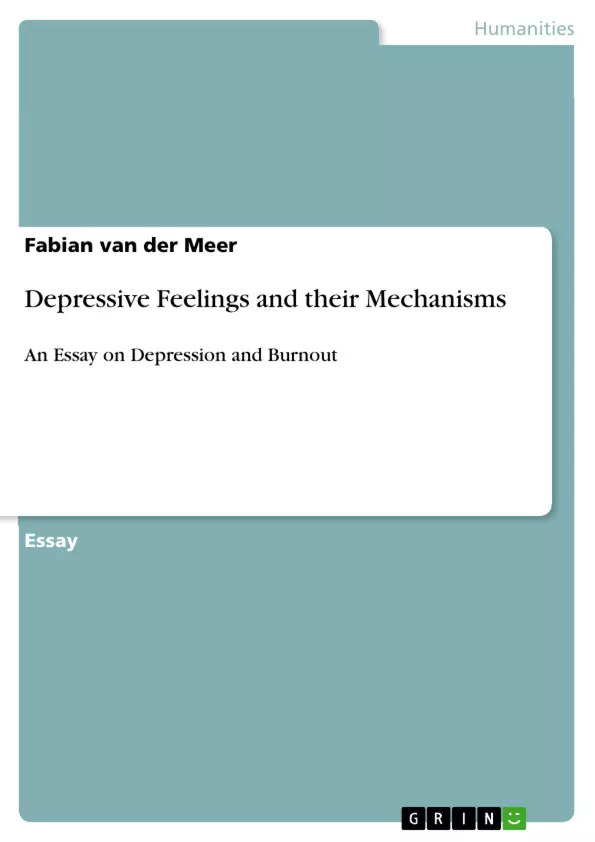This essay focuses on depressive feelings and on burnout. This was an essay where we had to explain psychological issues or themes from an evolutionary perspective. I explain in this paper why it is important to sometimes accept feelings of depression, it may help curb the development of clinical depression.
Generally, it is assumed in evolutionary psychology that traits which are adaptive will be selected by natural selection to be passed over to the next generation. Despite its terrible effect, I will argue that depression might be adaptive. More specifically, I will argue that we benefit from a mechanism which is of importance to us, but makes us depressive when we attend to it in a wrong way. Also, I will provide a solution to our depression problem.
That excruciating feeling after a few rough, stressful weeks of feeling extremely tired. You might not want too much social interactions anymore. You feel emotionally numb, while also feeling unstable. You start thinking negatively about otherwise normal events or people, also even about yourself. Sounds familiar? Everybody has experienced an episode in their life where one felt down. This can happen after the loss of a loved one, a disappointment concerning regarding a promotion you didn’t get, the list goes on. It is a mere emotional response to some event in one’s life, you can say. You come across a lot of semi-philosophical, existential answers if you google as to why people experience down-episodes in their lives.
Table of Contents
- Why We Should Allow Ourselves to Feel Bad and Do Nothing for a While
- Is Depression Adaptive?
- The Homeostatic Regulation
- Reactive Depression
- Clinical Depression
- Burnout
- The Solution
Objectives and Key Themes
The main objective of this text is to argue that depression, despite its negative impact, can be viewed as an adaptive mechanism. The author aims to explain how the body's natural homeostatic regulation, while often beneficial, can lead to depression and burnout if not properly managed. The text offers a solution to address these issues, advocating for a shift in societal attitudes and workplace practices towards better mental health.
- Adaptive nature of depression
- Homeostatic regulation and its role in mental health
- Distinction between reactive and clinical depression
- Similarities between depression and burnout
- The importance of mental health days and reducing stigma
Chapter Summaries
- Why We Should Allow Ourselves to Feel Bad and Do Nothing for a While: This introductory chapter establishes the context by discussing the common experience of feeling down and introduces the concept of depression as a possible adaptive response.
- Is Depression Adaptive?: The author delves into the biological mechanism behind depression, explaining how it can be viewed as a homeostatic response to emotional disturbances. The chapter distinguishes between reactive depression, a temporary adaptation to stressful events, and clinical depression, which occurs when this homeostatic process becomes dysfunctional.
- Burnout: The text explores the similarities between burnout and depression, highlighting the shared underlying mechanism of a prolonged homeostatic imbalance caused by excessive stress.
- The Solution: The author proposes a solution to prevent depression and burnout, advocating for individuals to recognize and address reactive depression through rest and self-care. The chapter also discusses the need for societal change, including reduced stigma around mental health and workplace policies that prioritize employee well-being.
Keywords
This text focuses on the concepts of depression and burnout, exploring their adaptive nature and the role of homeostatic regulation in their development. Key terms include reactive depression, clinical depression, homeostasis, self-regulation, mental health days, and the importance of reducing stigma surrounding mental illness.
Frequently Asked Questions
Can depression be considered adaptive from an evolutionary perspective?
Yes, the essay argues that depression might be a homeostatic mechanism that helps the body respond to emotional disturbances and stress.
What is the difference between reactive and clinical depression?
Reactive depression is a temporary adaptation to stressful life events, while clinical depression occurs when this regulatory process becomes dysfunctional.
How is burnout related to depression?
Both conditions share an underlying mechanism of homeostatic imbalance caused by prolonged, excessive stress.
Why should we allow ourselves to "feel bad" sometimes?
Accepting these feelings may help curb the development of severe clinical depression by allowing the body's self-regulation to take place.
What societal changes does the author propose?
The author advocates for reducing the stigma around mental health and implementing workplace policies like mental health days.
- Citation du texte
- Fabian van der Meer (Auteur), 2018, Depressive Feelings and their Mechanisms, Munich, GRIN Verlag, https://www.grin.com/document/489408



